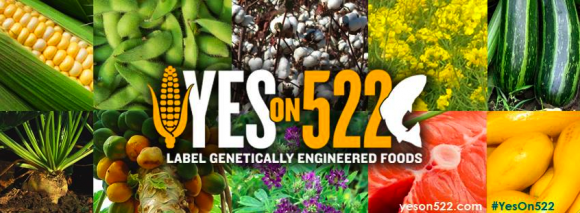
Why Label Genetically Modified Food?
by: Yes on I-522 Posted on: September 08, 2013
Editor’s Note: We spoke with Elizabeth Larter, the official spokesperson for the Yes on Washington State Initiative 522 campaign. If passed in November 2013, I-522 will require genetically modified foods in Washington State to be labeled. See here for our conversation with the No 0n I-522 campaign.
What are some major misconceptions about I-522? Can you clarify them?
I-522 is a common sense and simple measure. Yes on 522 has the support of real Washingtonians. Over 5000 donors and more than 350,000 Washingtonians signed to get this on the ballot. In contrast, our opponents, backed by 5 out-of-state corporations, are trying to confuse voters. They are more concerned with protecting their bottom line than with giving you more information about the groceries you are buying. I-522 will not cost you more money at the grocery store. Food manufacturers constantly re-label and update their packaging. It is part of doing business. I-522 is also not confusing or has arbitrary exemptions. I-522 was written to conform with common labeling standards. Just like your local pizzeria doesn’t have to label all of the ingredients and nutritional content, I-522 doesn’t require labels at restaurants. I-522 would label the frozen pizza, just like our labeling laws already require labeling for nutritional information at the grocery store. I-522 would simply require that a small bit of information be added to the package so grocery shoppers know if that frozen pizza was produced with genetically engineered ingredients.
I-522 is common sense and is about giving Washingtonians more information so they can make the best grocery buying decisions for themselves.
Why is labeling genetically modified foods important for Washington State’s economy?
Initiative 522, to label genetically engineered food, is about giving every Washington the freedom to choose genetically engineered foods or not when buying groceries. Shoppers have the right to know what’s in their food and should have a choice when at the grocery store. Some of Washington’s top exports are under testing to be genetically engineered. Labeling these products could help our export markets for the 64 countries that already require labeling of GMO foods.
Does I-522 have a connection to consumer rights law? How can I-522 be seen as a twenty-first century application of historical consumer rights law?
I-522 gives consumers the information they need to make informed choices about the food they buy. This is the most basic form of consumer protection.
How is the labeling of genetically engineered food in Washington State an end in itself and a means toward broader reform?
If I-522 passes, Washington would join Connecticut, Maine and Alaska in passing labeling laws. Connecticut and Maine passed their labeling laws in mid-2013, though if I-522 passes Washington’s law would go into effect first. Alaska passed a law in 2005 to label genetically engineered fish and shellfish. Winning in Washington will help provide momentum for the national GMO labeling movement.
Should I-522 pass, it is foreseeable that a corporation that produces genetically engineered food may sue Washington State on the grounds that labeling genetically engineered food violates the corporation’s right to privacy. How would you respond?
The government’s right to require GE labeling is beyond question. A company can keep its recipe secret, but can be required to disclose its ingredients and other nutritional information.
One Response to “Why Label Genetically Modified Food?”
Articles On Dirt
Dirt: Dirt
- Mar 6 Re-Imagining Local Public Space, From Parks to Post Offices
- Nov 7 Google Cache Snapshot-Oregonlandco.com, 9/15/13
- Nov 7 Testimony
- Nov 7 Sustainable Forestry Initiative Confirms
- Sep 8 Why Label Genetically Modified Food?
- Sep 8 Why Not Label Genetically Modified Food?
- Sep 8 When Industrial Slaughterhouses Are Proposed
- Aug 8 ¡HUELGA! Mixteco and Triqui Farmworkers commence second Work Stoppage at Sakuma Brothers Farms, Inc.
- Aug 8 Bolivia: Building Resilience To Climate Change Through Indigenous Knowledge – The Case Of Bolivia
- Jun 8 A Conversation about School Lunches, a Student and a Farmer
- Oct 21 On Kids and Food
- Sep 30 Empowered Latino Farmers (Spanish & English Translations Included)
- Sep 16 Whatcom Farm-to-School: Tackling Food System Challenges One Lunch at a Time
- Aug 10 Sludge, Whose Jurisdiction? (Part 2)
- Jul 30 Sludge, Whose Jurisdiction? (Part 1)
- Jul 9 Rethinking the Peasant
- Jun 25 The Beginning of Regional Food Governance?
- May 29 Urban and Suburban Agriculture Empowers Environmental Stewards
- May 13 Northwest Soil Science: Nitrogen Mineralization
- Feb 3 WA Conservation Districts: An Introduction
- Jan 20 Planning For A Future: Protecting The Ground
- Jan 12 Recirculating Farms
- Dec 30 Columbia Basin Water Development
- Jan 25 No Fisherman Deserves a Toxic River
- Dec 15 Conserving Working Lands, Native Species, and Fertile Soil
- Nov 1 Protecting Dirt, Among Other Things
- Oct 25 Coming Soon


by: Stacey Henryon: Saturday 14th of September 2013